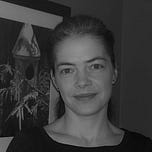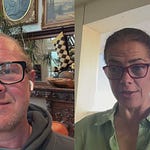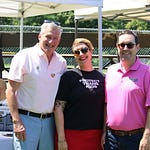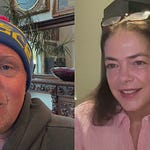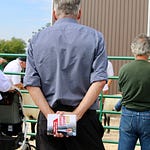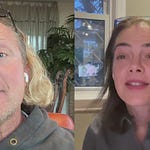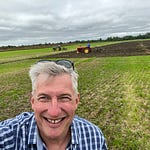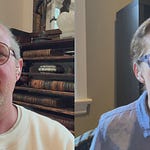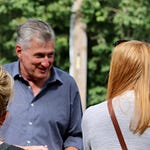The book is available in print, ebook and audio book formats.
Climbing Mount Carleton
Bruce Fanjoy grew up in a small town on the East Coast. He was an active kid, a boy who enjoyed running around and having adventures. One of his ambitions was to climb mountains. The closest one to where the family lived was big enough to be intimidating, at least to a kid. It was the first big hill he ever climbed. Its name? Mount Carleton.
I know. You’d write this in a novel and the editor would roll her eyes so far, they’d drop out of her skull and get lost under a dusty couch, amid old bits of popcorn and stranded cat toys. But it’s true.
Bruce Fanjoy spent his life never wanting to run for political office, at any level. So far so common. Some of us may think about it as a possibility for ourselves, but typically we sit back down. We don’t really know in all the details exactly what the steps to become an official candidate are, and from there what one must do to get elected as a representative of a party, or as an independent. But we are all aware that it’s a long and paperwork-heavy road that leads to seeing one’s name on a ballot.
Except for the Longest Ballot Committee doofuses, I guess. But then, they just sign up and have their name on a ballot that’s not connected to anything. It’s just a lark.
Running for office is a real thing with serious steps and a ton of work. It’s difficult and expensive. Sometimes a little boring, too. Can you imagine repeating yourself thousands of times, telling your story over and over and over again without making people feel like you’re sick of hearing yourself say the same stuff?
How much cheap coffee can you tolerate? Donuts, rubber chicken and pancake breakfasts? And the forms, yeesh. All those t’s to cross and i’s to dot. That would stop me right there.
Then you get vetted, which means strangers go through your dirty laundry with a fine-tooth comb, trying to find anything that might turn you into a bozo eruption. Then, assuming you pass that test, you have to fight other party hopefuls in a nomination contest. (Something Fanjoy did not have to do in the end, after the other candidate decided to withdraw.)
Once you’re the party’s nominee, there’s an onboarding process and then there’s staff and organizers and no shortage of people telling you what to do, when and how. As for the election campaign itself, well, you better be ready for five weeks of intense emotions and nowhere near enough breaks.
Electoral politics is hard work, and most candidates don’t do it for the publicity or notoriety and certainly not for the money. A member of Parliament earns a good salary, and if they last long enough in office, they get a solid pension. But the hours are very long, and the work is endless.
Also? Most candidates on the ballot don’t win their campaign. Only one person per riding does. All the others, who work just as hard as the winners, go back to their previous lives and never go near that parliamentary pension.
I’ve covered politics for well over 20 years, and in my experience, most people get into it to serve. They have ideas they want to put forward and causes to champion. They have benefited from the community and want to give back. Some may think a stint as an MP will look great on their resume (it would), but they are primarily concerned with how to be of service to others.
Whatever the reasons to become a politician, laziness is not among them. Members of Parliament work hard, most of the time very far away from home. I’m not trying to make them sound like they need pity or anything, simply pointing out that while the pay is good once you do get elected, the work is arduous. It’s a job.
Why would someone like Bruce Fanjoy, recently retired from a successful career in the private sector, launch himself into a fight against the most difficult and unpleasant politician we’ve seen in this country in a very long time?
You have to go out and meet people, some of whom want nothing to do with you. This was especially true for Fanjoy in 2023 and 2024, when the federal Liberals had ceased being popular, and I’m trying to be nice when I put it that way.
I went to a few events with him and his wife Donna in the summer of 2023. The first one was Canada Day, at Claudette Cain Park in Riverside South. Bruce would introduce himself and offer a card with his photo, basic information, and the website his brother Stephen had set up for his campaign.
By that point it had been nearly two years since the September 2021 general election which had returned the second Liberal minority – the first minority being in 2019. By 2023, after the pandemic, the bloom was off the Trudeau rose.
As I walked behind the Fanjoys, camera in hand, I saw many people stiffening up when they realized the smiling man was hoping to run for Team Trudeau. A few refused to have anything to do with a Liberal, but they did so politely. Most of the people we met reacted with a surprised chuckle. “Wow,” they seemed to think. “You’re either very brave or slightly off your rocker.”
Canada Day is not a political rally, so Fanjoy was careful to keep interactions short, especially when the people he was talking to had children and were preoccupied with picnics more than politics. A few people offered kind words of encouragement and a couple thanked him for proposing an alternative to the Conservatives.
For over two years, Bruce Fanjoy has gone out in his community every day to meet people. He repeated his story thousands upon thousands of times. Who he is, what he believes in, and how what he’s done in his life up to that point will help him unseat Poilievre, and give the people of Carleton the kind of federal representation they deserve.
He was also clear and transparent with the people he met that he was doing it to put a serious dent in the toxicity that’s taken over the Conservative party since the trucker wing elected the only leadership candidate who openly supported them.
Even though he’d been involved in his community for many years, as a hockey dad, an activist and a board member of Bike Ottawa, the exercise of knocking on doors was a powerful lesson in humility as Fanjoy discovered how many people had no sweet clue who he was. Eventually, word of mouth started doing what it does best and when people opened their door, they would exclaim things like, “Oh! It’s you! I was wondering when you’d show up!”
Politics can be more ungrateful than the worst teenager. But it can also be rewarding. One of the most memorable people Fanjoy encountered early in his campaign was a person who moved to Canada many years ago and was a permanent resident but not a citizen yet, because they’d never taken that final step. That person went through the process and officially became a Canadian citizen a few months after meeting Bruce Fanjoy, just so they could vote for him.
Pierre Poilievre won the riding of Carleton in 2021 with 49.9% of the votes against 34.3% for the second-place Liberal. In 2019, the numbers were 46.4% and 38.2%, respectively. But in the Trudeau wave that returned a strong majority in 2015, Poilievre’s margin of victory was much slimmer: 46.7% against 43.7% for the runner-up.
The polling aggregator 338Canada has consistently shown it as Conservative blue. Fair enough, I guess, until a stunning upset at the ballot box.
When I first chatted with Fanjoy about the possibility of running against Poilievre, I thought his odds weren’t exceptionally good, but I knew they were better than polls would suggest.
I had a few reasons for thinking that. First and foremost, the occupation of Ottawa. We’ll talk about this in more detail shortly. Suffice to say for now that for most people in the Ottawa area, the occupation of our downtown was an affront we won’t forget anytime soon.
Another reason is that while the Trudeau Liberals had outstayed their welcome, most Canadians did not appreciate Poilievre’s tone, and plenty of voters worried he would be ideologically too far to the right.
You’d be amazed to hear how many variations there are of “you’re wasting your time” and Bruce Fanjoy has heard every single one of them. But in a democracy, campaigning to offer voters a choice is never a waste of time.
The funny thing is, the more doors he knocked on, the more convinced he became that what the poll aggregators were saying about Carleton was not a true reflection of what the voters of Carleton said when he took the time to listen to them.
This short book will, I hope, accomplish two things. The first is to remind voters everywhere in Canada that they are the ones with the power to decide who governs them. The second is to show just how much voters in this country want to avoid a smaller, less spray-tanned version of Donald Trump in Ottawa.
Oh, and a bonus third: That when good people come together for the greater good, we usually win.

